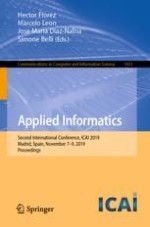2019 | OriginalPaper | Buchkapitel
Connecting CS1 with Student’s Careers Through Multidisciplinary Projects. Case of Study: Material Selection Following the Ashby Methodology
verfasst von : Bruno Paucar, Giovanny Chunga, Natalia Lopez, Clotario Tapia, Miguel Realpe
Erschienen in: Applied Informatics
Aktivieren Sie unsere intelligente Suche, um passende Fachinhalte oder Patente zu finden.
Wählen Sie Textabschnitte aus um mit Künstlicher Intelligenz passenden Patente zu finden. powered by
Markieren Sie Textabschnitte, um KI-gestützt weitere passende Inhalte zu finden. powered by
